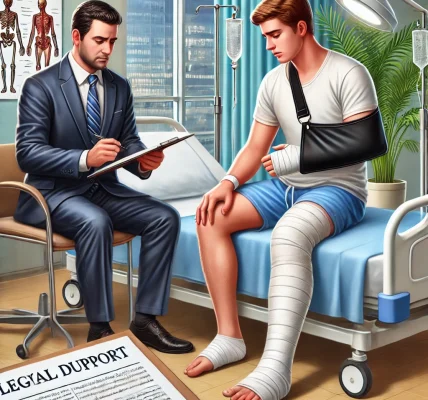When you suffer an injury due to someone else’s negligence, you may be entitled to compensation through a personal injury claim. However, one crucial factor that can affect your ability to file a lawsuit is the statute of limitations. This legal time limit determines how long you have to take legal action before you lose your right to seek compensation.
Understanding the statute of limitations is essential for protecting your legal rights and ensuring that you don’t miss the deadline to file your claim. In this guide, we’ll cover:
- What the statute of limitations is
- Why it exists
- Statute of limitations for personal injury claims in different states
- Exceptions that can extend or shorten the filing deadline
- What happens if you miss the deadline
- How to protect your rights and file your claim on time
What Is the Statute of Limitations?
The statute of limitations is a law that sets a deadline for filing a lawsuit after an injury or accident. If you fail to file your claim within this period, you may lose your right to pursue compensation. The specific time limit varies based on:
- The type of legal claim (e.g., personal injury, medical malpractice, wrongful death)
- The state in which the injury occurred
- Any exceptions that may apply to your case
For personal injury claims, most states set the statute of limitations between one and six years from the date of the accident.
Why Does the Statute of Limitations Exist?
The statute of limitations serves several important purposes:
1. Protects Evidence Integrity
- Over time, evidence can become lost, and witness memories may fade.
- A deadline ensures cases are brought forward while evidence is still reliable.
2. Encourages Timely Legal Action
- Victims are motivated to seek justice without unnecessary delays.
- Defendants are protected from indefinite legal threats.
3. Promotes Fairness in Legal Proceedings
- Lawsuits filed long after an incident can lead to unfair trials due to missing evidence.
- Timely claims help ensure a just legal process for both parties.
Statute of Limitations for Personal Injury Claims by State
Each state sets its own time limits for filing a personal injury lawsuit. Below is a general overview of the statutes of limitations in different states:
| State | Statute of Limitations (Years) |
|---|---|
| California | 2 |
| Texas | 2 |
| New York | 3 |
| Florida | 4 |
| Illinois | 2 |
| Pennsylvania | 2 |
| Ohio | 2 |
| Georgia | 2 |
| Arizona | 2 |
| Nevada | 2 |
⚠️ Important: The statute of limitations can vary based on specific case circumstances. Always check your state’s latest legal guidelines or consult a personal injury attorney.
Exceptions That Can Extend or Shorten the Filing Deadline
While the statute of limitations is generally strict, there are exceptions that can either extend or shorten the time you have to file a claim.
1. Discovery Rule (Extension)
- If the injury was not immediately apparent, the statute of limitations may begin from the date the injury was discovered rather than the date of the accident.
- Example: A person exposed to toxic chemicals may not develop symptoms for years. The time limit may start when the condition is diagnosed.
2. Minor Victims (Extension)
- If the injured party is a minor (under 18 years old), the statute of limitations may be paused (“tolled”) until they reach adulthood.
- Example: If a child is injured in a car accident at age 15, the time limit may not start until they turn 18.
3. Defendant Leaves the State (Extension)
- If the person responsible for your injury leaves the state before you file a claim, the deadline may be paused until they return.
4. Government Claims (Shorter Deadline)
- If your injury involves a government entity, the deadline is usually much shorter (sometimes as little as 6 months).
- Example: If you were injured due to a city bus accident, you may have to file a notice of claim within 90 to 180 days before filing a lawsuit.
5. Medical Malpractice Cases (Varies)
- Some states apply different rules for medical malpractice cases, especially when injuries are discovered later.
What Happens If You Miss the Deadline?
If you fail to file your claim within the statute of limitations, the consequences can be severe:
- Your case will likely be dismissed. Courts typically do not accept late claims.
- You lose your right to compensation. Even if you had a strong case, you won’t be able to recover damages.
- The defendant is no longer legally liable. The at-fault party will not be required to pay for your injuries.
However, if you believe you missed the deadline due to a valid exception, consult a personal injury lawyer to explore possible legal options.
How to Protect Your Rights and File Your Claim on Time
To ensure you meet the statute of limitations deadline, follow these important steps:
1. Seek Medical Attention Immediately
- Prompt medical treatment not only protects your health but also provides documentation of your injuries.
2. Gather Evidence
- Collect police reports, medical records, witness statements, and photos of the accident scene.
3. Consult a Personal Injury Attorney
- A lawyer can help determine your exact deadline and ensure your claim is filed correctly.
- They can also help navigate exceptions that may extend your filing time.
4. Avoid Delays
- Even if you think you have plenty of time, start the claims process early to avoid unexpected obstacles.
5. Keep Track of Deadlines
- Mark important dates on your calendar and set reminders for legal actions.
Final Thoughts
The statute of limitations is a critical factor in any personal injury case. Knowing how long you have to file a claim and understanding the exceptions can make a significant difference in your ability to recover compensation.
If you have suffered an injury due to someone else’s negligence, don’t wait—consult a personal injury lawyer as soon as possible to protect your rights and ensure you file within the legal time frame.
By acting quickly and seeking legal guidance, you can maximize your chances of securing the compensation you deserve. Don’t let time run out on your claim—take action today!




